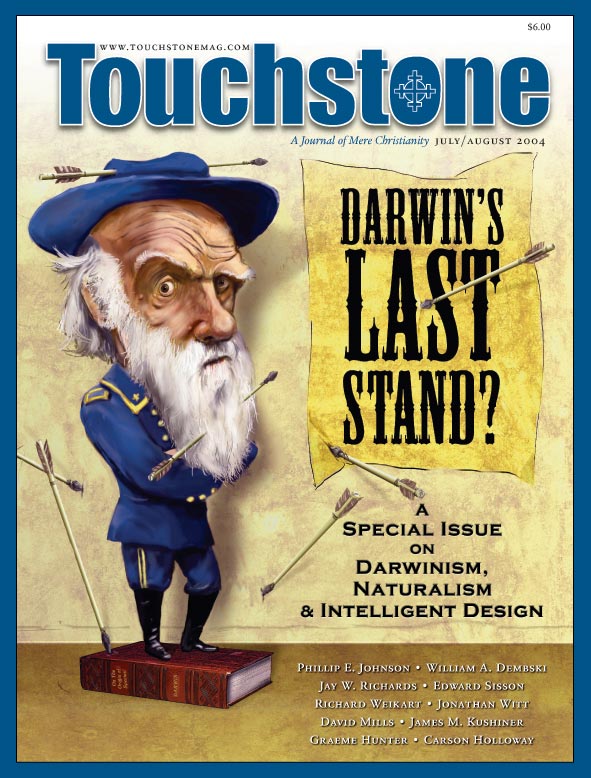The Gods Must Be Tidy!
Is the Cosmos a Work of Poor Engineering or the Gift of an Artistic Designer?
by Jonathan Witt
When as a boy I read “The Scouring of the Shire” near the end of J. R. R. Tolkien’s The Lord of the Rings, I could not understand why Tolkien felt the need to tack on such an anti-climactic and shabby bit of evil. Only later, as I began to notice modernity’s penchant for ugliness in the world beyond Middle Earth, did I understand that the scouring of the Shire bespoke a present evil, a malevolence insidious precisely because it lacked the stark drama of the trenches or the gas chambers.
I came to understand that the demolition of the hobbits’ lovely village possessed the striking lines of caricature not because it was unrealistic but rather because the depiction is so sharp and trenchant. Familiarity may breed contempt, but it can also breed cataracts, an incapacity to see a thing vividly, truly.
God of the Nazis
The twentieth century was, in its darkest moments, an arresting illustration of the will to power, but it also exhibited a less imposing if somewhat more curious urge: what could be aptly termed the will to ugliness. The perversely drab “pre-fabs” of postwar England, the American slum projects constructed by a later generation, the willfully dissonant monstrosities of much modern high architecture, the willfully tortured, obscure, and graceless prose of the deconstructionists, even the black-eyed and anorexic grotesques of the Paris catwalks—all bespeak an age driven to throw up trappings repulsive in their embrace of detachment and death.
The cultural pedigree of this modern predilection for ugliness is old, various, and to some degree mysterious. But here I want to suggest that Darwinism—in which I include its DNA-inspired mutation, neo-Darwinism—has contributed to this will to ugliness not merely by underwriting a vision of the world as a godless accident, but also in the very way it critiques and thereby dismisses the idea of an Author and Designer of life.
What I call the a-teleological macroevolutionists—those who argue that the cosmos is the product of chance and has no intrinsic end or purpose—argue that life emerged by natural selection without design from single-celled organisms, and they claim to use strictly scientific methods to support their position. In truth, however, they often slip into what is essentially an aesthetic and theological argument against a designer.1 Others have noted this, but what has not been fully explored is the dubious nature of the evolutionists’ aesthetic argument.
Consider one especially prominent example, evolutionist Richard Dawkins’s critique of the mammalian eye in his The Blind Watchmaker: Why the Evidence of Evolution Reveals a Universe Without Design:
Each photocell is, in effect, wired in backwards, with its wire sticking out on the side nearest the light. . . . This means that the light, instead of being granted an unrestricted passage to the photocells, has to pass through a forest of connecting wires, presumably suffering at least some attenuation and distortion (actually probably not much but, still, it is the principle of the thing that would offend any tidy-minded engineer!)2
Never mind for the moment that it has been clearly demonstrated that the backward wiring of the mammalian eye actually confers a distinct advantage by dramatically increasing the flow of oxygen to the eye.3 Let us ignore that brilliant bit of engineering and look at Dawkins’s intriguing obsession with neatness. O brave new world whose supreme designer distinguishes himself first and foremost by his tidy-mindedness! Aldous Huxley has ably dramatized the horror of a society so engineered.
Jonathan Witt is a senior fellow and writer in residence at the Discovery Institute in Seattle. He and his wife Amanda have three children, whom they home school.
subscription options
Order
Print/Online Subscription

Get six issues (one year) of Touchstone PLUS full online access including pdf downloads for only $39.95. That's only $3.34 per month!
Order
Online Only
Subscription

Get a one-year full-access subscription to the Touchstone online archives for only $19.95. That's only $1.66 per month!
bulk subscriptions
Order Touchstone subscriptions in bulk and save $10 per sub! Each subscription includes 6 issues of Touchstone plus full online access to touchstonemag.com—including archives, videos, and pdf downloads of recent issues for only $29.95 each! Great for churches or study groups.
Transactions will be processed on a secure server.
more from the online archives

15.6—July/August 2002
Things Hidden Since the Beginning of the World
The Shape of Divine Providence & Human History by James Hitchcock
calling all readers
Please Donate
"There are magazines worth reading but few worth saving . . . Touchstone is just such a magazine."
—Alice von Hildebrand
"Here we do not concede one square millimeter of territory to falsehood, folly, contemporary sentimentality, or fashion. We speak the truth, and let God be our judge. . . . Touchstone is the one committedly Christian conservative journal."
—Anthony Esolen, Touchstone senior editor








